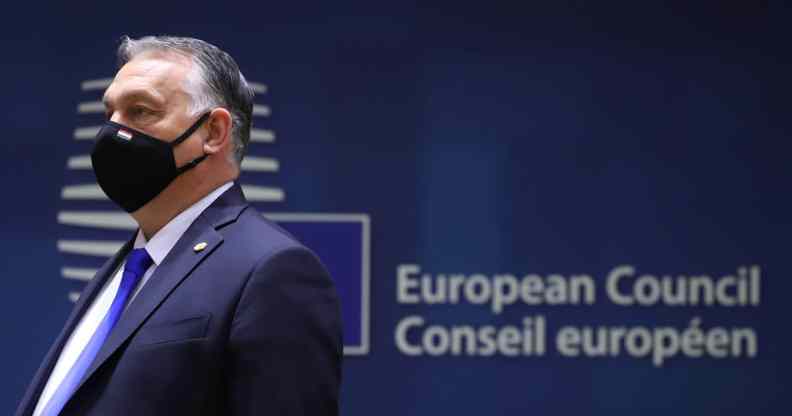Hungary’s cruel anti-LGBT+ law breaches basic human rights, say legal experts

Viktor Orbán at the December 2021 EU Leaders Summit (Photo by Valeria Mongelli / POOL/Anadolu Agency via Getty Images)
Legal experts have declared that Hungary’s anti-LGBT+ ‘propaganda’ law breaches human rights standards.
The law was passed in June and restricts access for under-18s to content depicting LGBT+ identities. Far-right populist prime minister Viktor Orbán has claimed that the law was brought in with the intention of protecting children and the rights of parents.
However, LGBT+ groups and human rights activists have labelled it deeply troubling, homophobic, and have accused the leader of inciting hate to deflect criticism. It comes as his government faces an upcoming election, scheduled for spring 2022.
Now, the Venice Commission, which advises the Council of Europe on constitutional law matters, has published an opinion condemning the law.
The constitutional law experts say that such restrictions can deny legitimate expression of sexual and gender identity, both of which are protected characteristics under the European Convention on Human Rights.
The ban, the Commission continues, contributes to a “threatening environment” for LGBT+ children and “leaves space only for one-sided and biased teaching, opening doors to stigmatisation and discrimination of LGBTQI people”.
The Commission also stated that the broad application and ambiguity of the Hungarian law means it violates other human rights, including the right to family life and the right of parents to educate their children in conformity with their own convictions.
“If parents buy their children under [the age of 18] a youth novel on LGBTQI persons or let them watch a film featuring LGBTQI characters, they violate the law,” the Venice Commission wrote. “In fact, it seems that it will no longer be possible for parents to teach their children to accept gay, lesbian or transgender people, or even help their children to accept their own sexuality.”
The European Commission opened an infringement case against Hungary in July. It argued that the legal changes constitute a violation of the rights to freedom of expression and non-discrimination as guaranteed under the EU Charter of Fundamental Rights, along with a miscellany of other violations of EU directives and the principles of the EU treaty.
If the Hungarian government continues to fail to address concerns, they could be taken to the EU’s top court by the European Commission.

